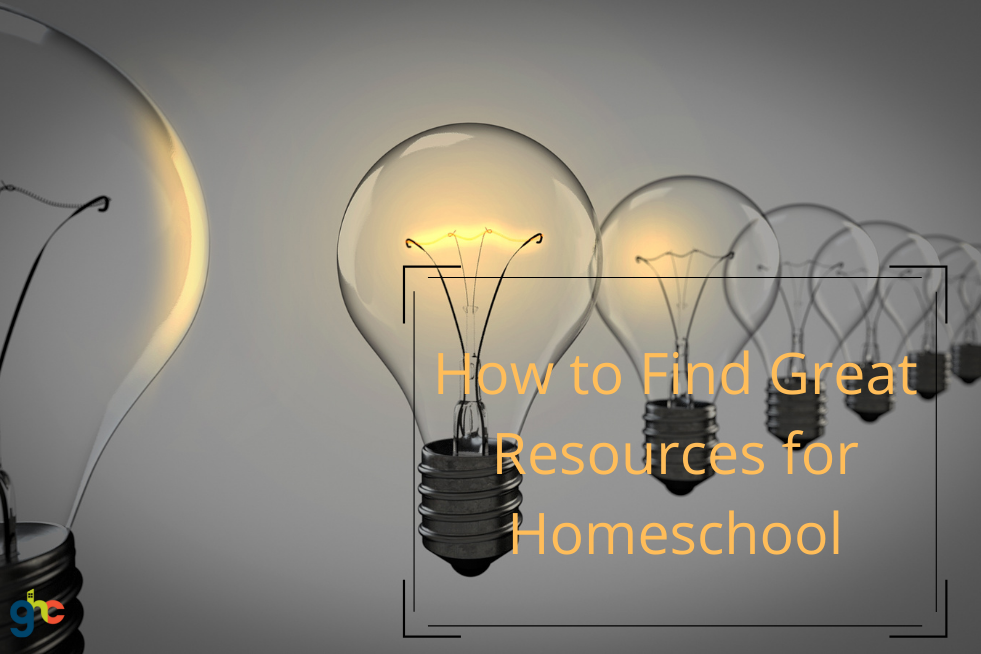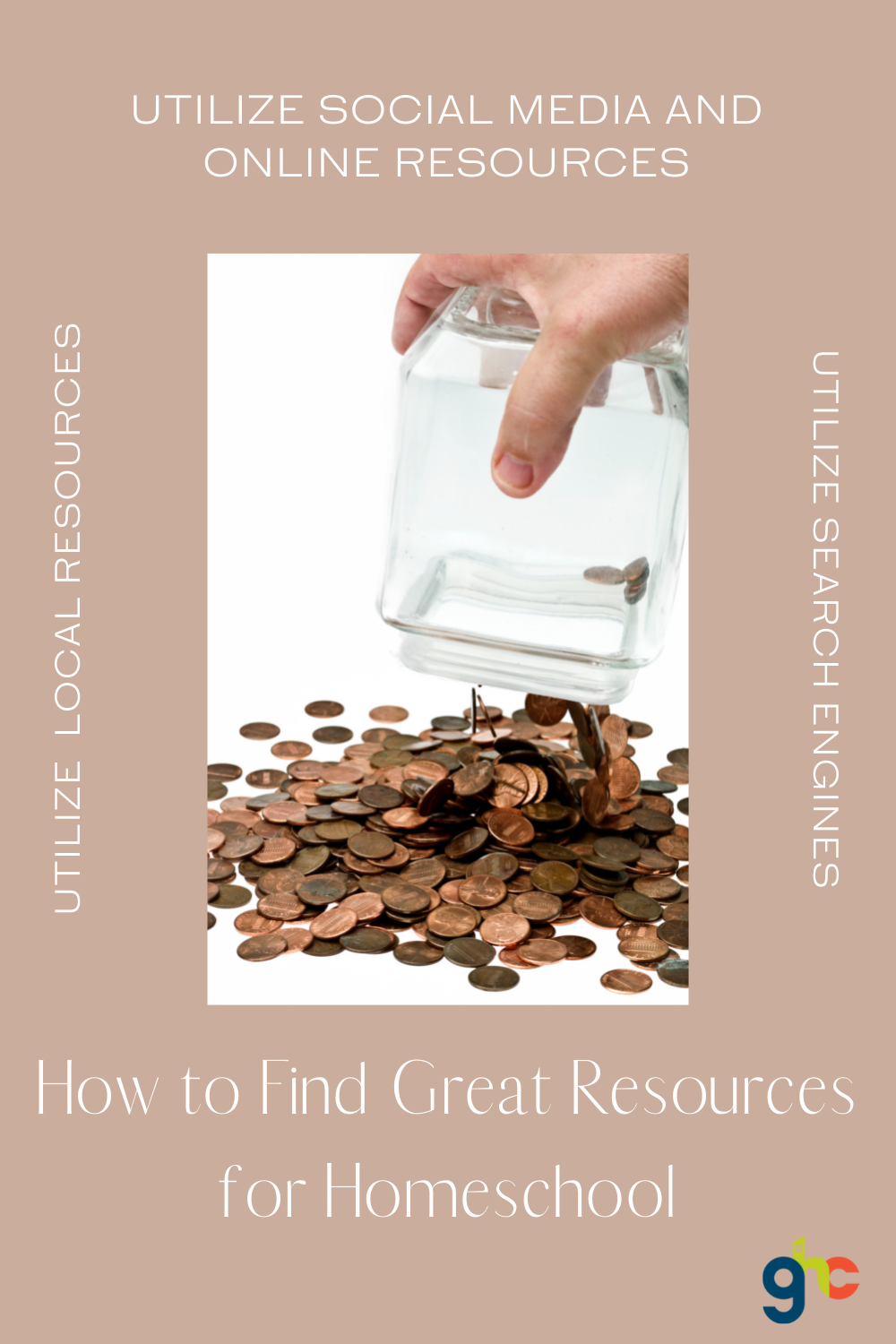When you homeschool, resources are of the utmost importance, especially when you are just getting started. However, seasoned homeschoolers will tell you, that finding the right resources for homeschool can sometimes be a bit of a challenge. We're here to help! There are many questions to be answered, whether internally or externally or you are starting at Pre-k or high school, and lots of paths to decide on, each of which can take a considerable amount of time. That time frame is amplified if we are just starting and have no actual homeschooling support people near us.
It’s also important to know that because homeschooling has become so enormously popular, there are now more resources for homeschool than ever been before. That makes it much easier but may give you more information to sift through if you’re looking for a specific style or method. It’s easy to become overwhelmed, so we’d like to help you with ideas that should make it a little easier to find great resources for homeschool and utilize them for your homeschool.

Where to Start When Considering Resources for Homeschool
The first thing you need to do is familiarize yourself with the homeschooling laws specific to your state of residence. Some states require more than others do and you should know exactly what those requirements are. Should there ever come a time when you are asked to prove you have met those requirements, you’ll want to make sure you have everything in order. Even the unschooling method can be documented, and progress tracked. Even in states where the requirements are lax, homeschooling records WILL BE IMPORTANT, especially at the higher grade levels. If your child decides to pursue college, these records will be necessary, and they could be important for some career choices, as well.
Utilize Homeschool Blogs
One of the most easily accessible resources for homeschoolers is a large number of homeschool-specific blogs that are available. Although a lot of people might turn up their noses at the idea of reading a blog in their search for information, you don’t want to pass up the possible gold mine you could find there.
Understand that those who spend money to host a website dedicated to homeschooling, especially if it’s a popular one, most likely have something worthwhile to say. These are parents who have walked the walk, so they’re talking the talk! They’re likely to share their own personal stories, both the ups and the downs, as well as extensive resources you might find very helpful. For instance, they might do reviews of certain curriculum, offer videos pertinent to a specific problem you’re having, or offer free resources that usually come in printables, worksheets, free ebooks, or giveaways for free homeschool curriculum.
Some homeschool bloggers are professionals, with tons of experience across a wide range of topics - some are even trained educators. Others might just be a mom or dad who’s “been there” and their stories and information can be just as helpful. More than anything, you’ll feel like you’re getting first-hand knowledge from someone who’s already been where you are now. And sometimes, that’s exactly what you need.
Like the one you’ll find at Great Homeschool Conventions, other blogs offer a wealth of information that is updated daily. Covering extensive topics, you’ll find information on specific styles, resources, curriculum, and so much more. Be sure to check back daily for new content that could be very beneficial for you.
Utilizing Social Media and online resources
Even before you actually “take the plunge” into homeschooling, social media can be an excellent source of resources for homeschool. Of course, like anything else, you have to screen these resources to make sure they line up with your core values, or they’ll be more detrimental than helpful. However, you’re likely to find something that feels perfect, as long as you spend some time getting to know the community itself.
Social media can allow you a glimpse into the lives who are doing exactly what you intend to be doing. The immersion into that lifestyle through this platform offers many different benefits, including your own personal participation.
On Facebook, in particular, you’ll find a variety of resources, including groups, pages, and profiles that offer a wealth of information. These platforms are great because you can actually engage the conversation on a personal level, ask questions, review posts on topics you really care about and get to know other homeschoolers personally.
Our own Facebook page can be accessed HERE.
Find us on Twitter, HERE.
Follow us HERE on Pinterest.
Interact with us on Instagram HERE.
In addition to social channels, there are resources for homeschool in terms of online resources. Some of these online resources teach classes or give you free options of curriculum to start with. Online sites like Khan Academy give resources in the way of classes that can be purchased. A foreign language can be learned through Duolingo (both free and paid). These online educational resources, and others like them, are a great place to start looking if you're looking for something online.
Utilize Search Engines
You’ve probably used the term, “Just Google it” more than once in your life. Someone may have even said that to you as a form of advice. The truth is, search engines are an excellent resource for homeschool, especially if you’re looking for specific things. For instance, if you’re going with a Relaxed homeschooling style, you might want to know how to write up a lesson plan for those days or utilize some form of record-keeping that isn’t exactly like what everyone else is using. A quick search on Google or Yahoo could lead you to a variety of resources, from printouts to video tutorials or even step-by-step instructions you can print out and refer to as needed. The same could be true for lesson plans, grade cards, support groups, or field trip ideas, and other ways to find enrichment for you or your homeschooler.
Tons of information is available, on any topic you could think of to search. One of the most important is finding resources for graduation protocols, transcript writing, and college prep. Even if your child is a preschooler, you can never learn these things too early. If you’re planning to continue the homeschooling life, they WILL be necessary, and getting a head start never hurt anyone.
Check for Local Resources
There could be a wealth of homeschooling resources right in the town or city where you live. Look for homeschool co-ops, groups, support groups, nonprofit organizations, and clubs that serve your area, as well as well-known groups like the 4-H and sports teams. These resources can lead to other resources as you begin to socialize and get to know other homeschooling families. Often, those that have been homeschooling for many years are very generous with information about resources for homeschool and can help lead you to those you probably never even heard of before.
Churches are another great resource for homeschooling families, as they can offer support, faith-based classes, and a wide variety of activities in which your children can participate. This is as beneficial to their academic needs as to their social lives.
While they may not be “local” as in, “right in your back yard,” other places you can physically go for homeschooling purposes include local libraries, the zoo, the park, local businesses and shops, and so much more. The term “extracurricular activity” is an oxymoron in a homeschool setting as virtually every activity can fit within your curriculum, i.e. be a learning experience. Once you’ve been homeschooling for a while, you’ll be able to spot a potential homeschool resource from a mile away.
Choose A Homeschooling Style When Looking for Resources for Homeschool
It may not have been your first consideration, but the homeschooling style you choose is very important, as is knowing your child's learning style. To pick the homeschooling style that works best for your family, you might have to do some trial-and-error exercises with a few to find what works best for your children. Even if you’ve homeschooled before, each child is different. What worked for one might not necessarily work for all. My own two children are opposites of one another and required two very different teaching styles because of their learning styles. On the other hand, you might find one that works for both or all of your children. Every family is different and what matters is finding what works for YOU.
Here’s a quick rundown of some of the most popular homeschooling styles:
The Montessori Style: This style focuses a great deal on allowing children to learn at a comfortable pace. This helps to maximize their potential and development, bringing them an excellent platform for independence, confidence, self-awareness, and dignity. Clutter and confusion are avoided at all costs, and there are no screens allowed during learning time, including no online courses. To learn more about this style, click HERE.
Unschooling: This very relaxed, child-led, interactive learning experience revolves around the idea that children are always learning, even when not “doing school” the way some people think it should be done. Depending on your child’s attitude and learning ability, it does have the potential to get out of control, but you can always change things around if you see that happening. To learn more about this style, click HERE.
Eclectic Homeschool: A sort of combination of both Relaxed homeschooling and Unschooling, the Eclectic style is still in a category all its own. These homeschoolers tend to borrow from many different curriculum choices, using whatever works best per subject. For instance, they might choose a math curriculum from Sonlight, but prefer a Charlotte Mason approach to the arts. To learn more about this style, click HERE.
The Charlotte Mason Homeschooling Style: There is no set (boxed) curriculum for the Charlotte Mason Method. In this style, you’ll lean more on Living Books (no fiction of any kind), with specific age groups being taught according to their level or stage of progress. Free afternoons, hobbies, and the child’s own interests also play key elements in this style. To learn more about this style, click HERE.
Classical Homeschooling: Known as an “ancient style,” the classical homeschooling method also uses levels to stay on track. Borrowing from the Charlotte Mason Style in terms of Living Books and the arts, there is also a heavy emphasis on the Latin language as a means of increasing capabilities in logic. To learn more about this style, click HERE.
Unit Studies: In Unit Studies, you stay on one topic which flows through all the subjects. Not only does this help to hold your child’s interest, but it also allows them to master a particular group of information completely. Boredom gives way to a natural curiosity while making your child think they’re just exploring the same thing from different angles. To learn more about this style, click HERE.
Traditional Homeschooling: This style looks more like what public school might look like if you simply did it at home, but without all the class changes and other busywork moments that tend to waste time that could be given to academics. It’s stricter than some of the other homeschool styles and leans more heavily on a boxed curriculum. To learn more about this style, click HERE.
Choose A Curriculum to Match Your Homeschool Style
Even those who choose the Unschooling or Eclectic homeschooling styles often use some sort of curriculum for at least a subject or two. That’s one of the best parts about homeschooling: you get to find exactly what works for your child and use it. This might mean crossing from one curriculum provider to another to piece together the perfect style, and that’s fine.
Some parents prefer a boxed curriculum that offers all of the educational materials for the entire school year across all subjects, with teacher resources included. That means each subject comes with all the necessary materials for you and your child, as well as lesson plans and more. This makes it easy to just spend a few hours a week planning and preparing and is preferable for some families. For others, this method doesn’t work as well due to scheduling or any one of a variety of other reasons.
Some companies offer a curriculum online. This almost feels more like a game for many children and can be quite beneficial, especially if you might need some instructional assistance. Most online programs offer easy-to-understand instructions for both parent and child, and easy-to-access records as well. For my daughter, we tried the online method, and I was able to print off each quiz and text she took to file in my records for the year. Although it didn’t work out for her in the long run, in the end, we did learn quite a bit from the experience.
The very best place to choose a curriculum is one of our Great Homeschool Conventions. Conventions provide an excellent environment in which to shop around from vendor to vendor, hear from a variety of speakers who will address topics you need to know about, and actually get your hands on the pieces of curriculum you are considering. This can drastically change things, giving you a real advantage in your homeschooling endeavor and helping to educate you in areas you might not have previously considered.

In Closing
To repeat, one of the best places to find extensive resources all in the same place is one of our seven regional Great Homeschool Conventions. There’s likely a Great Homeschool Convention near you! Since these are regional gatherings, we know that some families will be traveling farther than others. So, to make the whole experience a little easier, we offer some specials you might find helpful, including hotel discounts, military discounts, and free admission for active clergy.
At these Great Homeschool Conventions, you’ll have access to hundreds of speakers, great special events, and an extensive variety of vendors. Not only will be you be able to hear from the speakers on topics that truly pertain to you, but you’ll even be able to talk with them and other homeschool parents. This type of interaction is very important, especially if you’re just getting started.
To see a list of Convention locations, CLICK HERE.
To register, CLICK HERE.
To read additional blog content, CLICK HERE.
And remember, our Great Homeschool Conventions are: Equipping… Encouraging… FUN!
